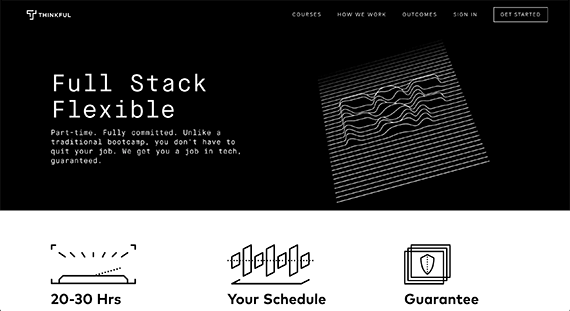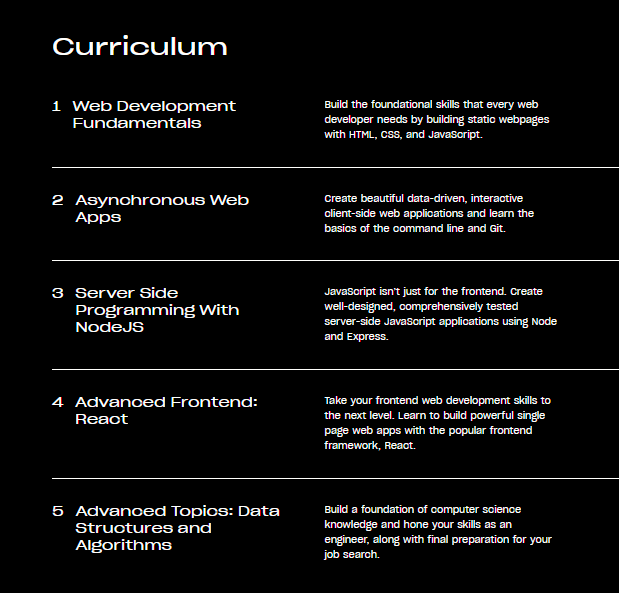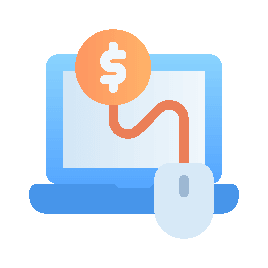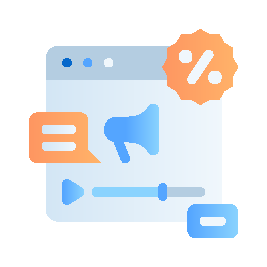Thinkful Bootcamp Review 2022

You're looking for the best online coding bootcamp and you don't know where to start.
New bootcamps are popping up every week now which makes it more and more difficult to make a decision and to do comparisons.
Based on my research, and after studying through them myself, I'd say it's Thinkful.
In this article, I'm going to review the Thinkful Bootcamp.

There are many practical things to consider, so I will do my best to approach it as if I were considering to do it myself.
Let's start off with the basics about what they do and then move on to their bootcamp.
Who is Thinkful?
Thinkful is an online learning platform that teaches you how to code.
All courses are 100% remote so you can take the courses at home, in a coffee shop, a library, at the gym.
Established in 2012 with headquarters in New York City, Thinkful has over 7,000 students.
They offer the following courses:
- Software Engineering
- Data Science
- Data Analytics
- UX/UI Design
- Project Management
- Technical Project Management
- Digital Marketing
You can view all of their courses here →
The Curriculum
Thinkful’s Coding Bootcamp is a fully remote course divided into 5 sections:

The skills and concepts covered in these lessons are practical and in demand to get a job.
As with any other quality coding bootcamp, the Thinkful bootcamp doesn't cost as much as a Udemy course.
It costs a few thousand dollars, but they do offer payment options and discounts for those who qualify.
Benefits of the Thinkful Bootcamp:
 One-On-One Teaching
One-On-One Teaching
There are hundreds, if not thousands of learning platforms out there, but what I like about Thinkful is that they offer one-on-one teaching.
What this means is that you get partnered with a mentor (coding instructor) and they help you through practical stages of your learning journey.
They currently have a pool of 280+ coding mentors with real experiences in real projects, so you’ll get tips from people who actually know what they’re doing.
As opposed to small or big classrooms, one-on-one teaching is more effective because each session you’ll have enough time to talk about your progress, roadblocks, and other concerns.
Some other benefits are:
- Open Q&A and Workshops of the daily instructional sessions.
- Slack community - Get help from other students and developers in their community chat. Learning how to code remotely can be isolating at times. Many self-learners hit a wall at some point, and without a support community, it’s hard to get past these walls.
 Transparency
Transparency
Very few online bootcamp learning platforms are as transparent about their success as Thinkful is.
One good differentiator is that they have 3rd-party auditors to confirm and validate their claims. You can read more at CIRR.
 Impressive Career Support
Impressive Career Support
When it comes to the Thinkful Bootcamp, they boast interesting stats:
- They guarantee you a job backed by a Tuition Refund Guarantee (more on this later).
- They prepare you for job interviews.
- They introduce you to companies for hiring purposes.
- Work 1-on-1 with a Career Coach for 6 months, or until you get hired.
- $21,137 is the average salary increase as reported by students.
- Over 80% job placement rate of graduates within 180 days of graduation.
There are hundreds, if not thousands of learning platforms out there, but what I like about Thinkful is that they offer one-on-one teaching.
What this means is that you get partnered with a mentor (coding instructor) and they help you through practical stages of your learning journey.
They are very credible and have over 7,000 students already.
Very few online bootcamp learning platforms are as transparent about their success than Thinkful is.
One good differentiator is that they have 3rd-party auditors to confirm and validate their claims. You can read more at CIRR.
Things to Keep in Mind:
 Tuition Refund Guarantee
Tuition Refund Guarantee
Thinkful is so confident of their program that they guarantee a tuition refund if you don’t get a job within 6 months after graduation. As written on their website:
We promise every graduate of our Web Development Bootcamp a job.
We're confident that if you put in the work, you can land a job as a developer. If you meet our graduation criteria, but don't get a job within 6 months, you will receive a full refund.
The big question now is what exactly is the “graduation criteria”?
A common misconception among beginners in these kinds of programs is that getting a full refund is going to be a piece of cake.
But getting a refund is honestly like a course entirely in itself.
You can check out the full list of qualifications to get a refund here, but here are some:
- You must graduate from the program within the expected duration (e.g. 6 months) and complete all requirements and course works.
- Be at least 21 years old upon graduating the program, be a US citizen or a green card holder, and proficient in the English language as assessed by a Thinkful staff.
- Do a number of job search activities like attending a coaching session once a week via phone or email; tracking your job search activity using their Job Tracker and showing the records to each coaching activities; applying to at least 10 positions a week; creating a personalized job search plan with your coach; and more.
You could say that these measures are put in place to make sure that you’re doing your part in actively looking for a job and increasing your chances of getting hired.
Ultimately, I think these qualifications work for your good, but it’s something you have to consider as you decide whether to go through with the bootcamp.
 Course Difficulty
Course Difficulty
A course’s level of difficulty is subjective as it depends on an individual’s skill and knowledge level.
I might find Javascript easy enough but the next student might not.
So what I’m trying to say here is you may have to spend more hours on the lessons than what you initially thought depending on how hard you find the lessons.
This is to just set your expectations that sometimes you might have to work longer than 20 hours a week to keep up with the lessons.
Student Reviews of the Thinkful Bootcamp:
Compared with other bootcamps on CourseReport, Thinkful tops the list with a 92% satisfaction rate (4.6/5) from over 850 reviews.
These are some impressive stats from a whole lot of students – especially if you do comparisons.
Who is better suited to talk about the bootcamp than actual students?
Here are a few short reviews:
For anyone considering taking a programming bootcamp, you'll find Thinkful's among the best, and most challenging programs online period!
- Joe H
I would recommend it to anybody in the market, 10/10 in my book.
- T. Riley
I found the mentorship to be the best part of the experience because they provide a ton of information beyond the course content itself. I would definitely recommend Thinkful to any beginner or intermediate tech professional.
- Isrrael
This course is for the dedicated and determined, but it's not like college or another school. You're working with real professionals in the field who can teach you exactly what you need to be successful.
- C. Ericson
There were often times in my previous attempts of learning to program that I would hit a wall. Without having any support to help me understand those concepts I would just give up thinking, 'I'm just not good at programming.' By being able to meet with my mentor three times a week, whenever those walls come up I'm able to break through before the thought of giving up even crosses my mind.
- G. Van Buren
Is a Web Development Bootcamp Worth the Price?
"Worth" is a very relative term to use.
A sports car may be worth the high price tag to some, and to others it may be ridiculous, so who is right?
I don't think some of the cosmetics brands are "worth" what they are priced at to be honest with you and I don't see too many of them closing up shop.
But if something can literally change your life and future, how can one measure the "worth" of it?
Considering the average developer salary is around $70,000 - $85,000, is spending around a tenth of that amount worth it?
The alternative is to spend $60,000+ on a tuition over 2-4 years and then there's still the risk of not finding a job.
What Jobs Are Students Getting After Completing the Bootcamp?
Let's start with some of the companies they have been hired at:


 and others
and others
The job breakdown is:
Frontend Developer
Software Engineer
Web Developer
Junior Developer
Other
Freelancer
What's the Average Salary After Completing the Bootcamp?
Frontend developer: $70,628 on average
Software engineer: $95,195 on average
Junior developer: $59,296 on average
Web developer: $66,238 on average
Source: Glassdoor.com
Is a Bootcamp a Formal Qualification?
I think they answer this part well themselves:
"Neither certificates nor degrees will get you a job as a programmer. We're not saying college isn't important. What we are saying is that if you want a job as a programmer you're about a thousand times more likely to get one if you learn, practice, and build real software. And we believe you'll be more prepared as languages and platforms continue changing."
Bootcamp vs Self-Studying?
Both of these options are definitely valid paths to decide on and each option has its pros and cons.
This briefly sums up the pros and cons for bootcamps:
(by bootcamps, I am referring to the Thinkful Bootcamp)
PROS
- You are guaranteed a job
- There are weekly workshops
- You meet regularly with a mentor
- You have a great slack community
- You follow a set schedule and routine
- You are partnered with a career coach
- You are a part of a proven program that works
CONS
- You need to be very disciplined
- It's not cheap. Usually thousands of dollars
This briefly sums up the pros and cons for self-studying:
(by self-studying I mean general cheap online courses)
PROS
- You learn in your own time
- Good for complete beginners
- Generally very cheap. Usually under $50
CONS
- There's no career support
- The support is generally bad
- There's no guarantee of a job
- There's not always a good community
There are 2 bootcamps to choose between:
| Flexible Bootcamp | Fulltime Bootcamp |
|---|---|
| 3 mentor sessions per week | Meet with your mentor daily |
| Flexible schedule | Structured schedule |
| Graduate in 6 months | Graduate in 5 months |
| Study 20 hours per week | Study 50 hours per week |
If you'd like to read more and get a $150 off Thinkful coupon towards the Flexible Bootcamp, click here
Conclusion:
In my view, as long as becoming a web developer is aligned with your goals and if you have the finances for it, a bootcamp is definitely something to be considered.
If you prefer normal online web development courses, click here.
If you are a bit confused about which path to take, you are welcome to send me an email.
I hope this article helped clear up any confusion for you :)
 by Kyle Prinsloo Last updated Jan 1, 2022
by Kyle Prinsloo Last updated Jan 1, 2022



